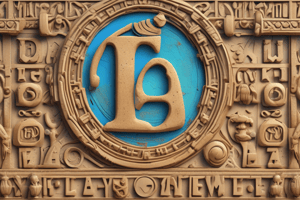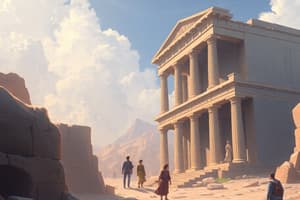Podcast
Questions and Answers
What is the historical stage that followed Ancient Greek?
What is the historical stage that followed Ancient Greek?
- Homeric Greek
- Attic Greek
- Koine Greek (correct)
- Mycenaean Greek
What are the three major divisions of all Greek people according to the Greeks of the ancient period?
What are the three major divisions of all Greek people according to the Greeks of the ancient period?
- Mycenaeans, Hellenes, and Spartans
- Spartans, Thebans, and Corinthians
- Athenians, Corinthians, and Thebans
- Dorians, Aeolians, and Ionians (correct)
What is the literary form of Archaic Greek used in the epic poems, the Iliad and the Odyssey, and in later poems by other authors?
What is the literary form of Archaic Greek used in the epic poems, the Iliad and the Odyssey, and in later poems by other authors?
- Attic Greek
- Koine Greek
- Homeric Greek (correct)
- Mycenaean Greek
What is the name of the magazine of crosswords and puzzles in ancient Greek?
What is the name of the magazine of crosswords and puzzles in ancient Greek?
What is the syllabic script in which the earliest extant examples of ancient Greek writing are found?
What is the syllabic script in which the earliest extant examples of ancient Greek writing are found?
What is the name of the international competition run for upper secondary students through the Greek Ministry of National Education and Religious Affairs?
What is the name of the international competition run for upper secondary students through the Greek Ministry of National Education and Religious Affairs?
What are the main dialect groups of Ancient Greek?
What are the main dialect groups of Ancient Greek?
What is the name of the first Harry Potter book translated into ancient Greek?
What is the name of the first Harry Potter book translated into ancient Greek?
What is the name of the language that developed after the conquests of Alexander the Great in the late 4th century BC?
What is the name of the language that developed after the conquests of Alexander the Great in the late 4th century BC?
Flashcards
Linear B
Linear B
The earliest form of ancient Greek, written in the syllabic script Linear B, dating back to around 1500 BC.
Homeric Greek
Homeric Greek
A literary form of Archaic Greek used in the epic poems, the Iliad and the Odyssey, and in later poems by other authors.
Koine Greek
Koine Greek
A new international dialect of Greek that developed after the conquests of Alexander the Great in the late 4th century BC.
Attic-Ionic
Attic-Ionic
Signup and view all the flashcards
Arcadocypriot
Arcadocypriot
Signup and view all the flashcards
Aeolic
Aeolic
Signup and view all the flashcards
Doric
Doric
Signup and view all the flashcards
Hellenistic Period
Hellenistic Period
Signup and view all the flashcards
Ancient Greek Education
Ancient Greek Education
Signup and view all the flashcards
Study Notes
Forms of Greek used from around the 16th century BC
-
Ancient Greek was used in ancient Greece and the ancient world from around 1500 BC to 300 BC, and is divided into the following periods: Mycenaean Greek, Dark Ages, the Archaic period, and the Classical period.
-
Ancient Greek was the language of Homer and of fifth-century Athenian historians, playwrights, and philosophers.
-
Ancient Greek has contributed many words to English vocabulary and has been a standard subject of study in educational institutions of the Western world since the Renaissance.
-
From the Hellenistic period, Ancient Greek was followed by Koine Greek, which is regarded as a separate historical stage, although its earliest form closely resembles Attic Greek and its latest form approaches Medieval Greek.
-
Ancient Greek was a pluricentric language, divided into many dialects, with the main dialect groups being Attic and Ionic, Aeolic, Arcadocypriot, and Doric, many of them with several subdivisions.
-
Homeric Greek is a literary form of Archaic Greek used in the epic poems, the Iliad and the Odyssey, and in later poems by other authors.
-
Scholars assume that major ancient Greek period dialect groups developed not later than 1120 BC, at the time of the Dorian invasions.
-
The Greeks of this period believed there were three major divisions of all Greek people – Dorians, Aeolians, and Ionians, each with their own defining and distinctive dialects.
-
After the conquests of Alexander the Great in the late 4th century BC, a new international dialect known as Koine or Common Greek developed, largely based on Attic Greek, but with influence from other dialects.
-
Greek, like all of the older Indo-European languages, is highly inflected, with nouns having five cases, three genders, and three numbers, and verbs having four moods and three voices, as well as three persons and various other forms.
-
The earliest extant examples of ancient Greek writing are in the syllabic script Linear B, but the Greek alphabet became standard in the 8th century BC, albeit with some variation among dialects.
-
Ancient Greek is still taught as a compulsory or optional subject especially at traditional or elite schools throughout Europe and is compulsory in the liceo classico in Italy.
-
Mastery of ancient Greek was considered essential for women of letters in the mid-to-late Nineteenth Century.The Teaching and Use of Ancient Greek Today
-
Ancient Greek is taught as a compulsory subject in Greece, and as an optional subject in various countries such as the Netherlands, Austria, Croatia, Belgium, and Germany.
-
In 2006/07, 15,000 pupils studied ancient Greek in Germany, and 280,000 pupils studied it in Italy.
-
Ancient Greek is a compulsory subject alongside Latin in the humanities branch of the Spanish bachillerato.
-
Ancient Greek is taught at most major universities worldwide, often combined with Latin as part of the study of classics.
-
Starting in 2001, an annual international competition "Exploring the Ancient Greek Language and Culture" was run for upper secondary students through the Greek Ministry of National Education and Religious Affairs.
-
Modern authors rarely write in ancient Greek, but some poetry and prose have been written in the language.
-
Harry Potter and the Philosopher's Stone, some volumes of Asterix, and The Adventures of Alix have been translated into ancient Greek.
-
Ὀνόματα Kεχιασμένα is the first magazine of crosswords and puzzles in ancient Greek.
-
Ancient Greek is used by organizations and individuals, mainly Greek, to denote their respect, admiration, or preference for the language.
-
Modern Greeks can still wholly or partly understand texts written in non-archaic forms of ancient Greek.
-
Ancient Greek is often used in the coinage of modern technical terms in the European languages.
-
Latinized forms of ancient Greek roots are used in many of the scientific names of species and in scientific terminology.
Studying That Suits You
Use AI to generate personalized quizzes and flashcards to suit your learning preferences.




